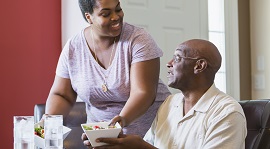Caregiving doesn't have to mean ignoring your own health

As a caregiver, how do you know when you're doing well?
Is it when the person you take care of is doing well? Caregivers often associate their own well-being with that of the person they're caring for. But it's not that simple. In doing so, you can become so wrapped up in caring for others that you neglect your own needs.
In reality, being a caregiver can bring it's own set of health risks. Research shows that caregivers are more likely to miss their own health appointments and eat a less nutritious diet than those who aren’t caregivers. Over time, these bad health habits—combined with the chronic stress of caregiving—can lead to depression, illness, disease and even premature death.
“It’s very difficult to get that across,” says Adele Mehta, director of senior outreach and caregiver services at Senior Community Services in Minnetonka. “Caregivers see themselves as somewhat invincible, because they know the work they’re doing is important."
But while the work you’re doing is very important, it’s still crucial to find time for your own care.

So, what's "normal?"
- Family caregivers spend an average of 24 hours a week caring for their loved ones.
- 1 in 4 caregivers spends 41 hours or more per week providing care.
5 ways to protect your own health
1. Give yourself permission to just say no.
Most people struggle at times with saying no. It just seems easier to say yes: Yes to baking cookies for the school bake sale (even if it means staying up late to do it). Yes to dinner with friends (even if it comes at the end of an exhausting week). It's easier to add one more thing than it is to feel guilty, or fear criticism.
And perhaps nowhere is this more true than with caregiving. It's easy to become so enmeshed in your role that it's hard to see situations in which "no" is perfectly justified.
If you need help recognizing those "no" occasions, talking to friends, fellow caregivers or even a counselor can be a first step.
“It kind of gives you permission to say ‘no’ when people say, ‘You shouldn’t need to do that,’ or, ‘That’s something your son could do,’” Mehta says.
Those same friends and support groups can also help you practice saying “no” gracefully.
Try it: Find one thing this week you can (politely) say "no" to.
2. Be prepared to accept offers of help.
Surprisingly, many caregivers turn down offers for help from friends and family members. Maybe it sounds silly when it's someone else, but consider if you've ever turned down help—and if so, why.
Often, caregivers assume no one can care for their parent, spouse or friend as well as they can. And you know what? That may be true, says Mehta. “But that doesn’t mean that’s the way it has to go,” she says.
Involving others in caregiving tasks not only frees up more time in your life, it helps the care receiver see that they have a wide base of support, and they don’t always need to rely on you.
Try it: Come up with a list of tasks you need help with, or tasks you don’t particularly enjoy. This way, when someone asks to help, you already have several options for them to choose from.
If you can’t think of any tasks when someone asks to help, simply thank them for their offer and let them know you need to think it over. Follow up once you’ve put a list together.
3. Find people to talk to who get it.
Caregiving can be hard. It can be complicated. It can be lonely. But here's the thing: As a caregiver, you are far from alone. There are millions of others who can empathize with the day to day challenges of your role, offer realistic suggestions or just listen.
Support groups can give you a safe space to vent your frustrations, find caregiving resources and even make new friends. Peers can also help you practice saying “No” (see point number one).
Try it: Check with local senior care organizations to find a caregiver support group in your area, or visit association websites that address the health condition(s) you’re helping your loved one navigate.
4. Make the effort to involve others.
When your plate is already full with caregiving tasks, filling in other family members and friends can seem like just one more thing you don't have time for.
Consider it an investment: an investment in your future health and happiness. And that's worth more than the back burner.
Drawing others into the caregiving team, rather than trying to do it all yourself, may take a bit of work upfront. But in the long run it will lighten your load.
Try it: Start by calling everybody together for a family meeting. If needed, use a video messaging service like Skype or FaceTime to include out-of-town carers.
Nervous? Consider hiring a facilitator to run the meeting. Many senior care and caregiver organizations offer this service.
5. Get creative about hiring help.
There are many forms of professional senior care services available, from adult day programs to in-home, around-the-clock care.
Admittedly, hiring professional help can be expensive, but even a couple of hours per week can make a big difference.
Try it: Come up with one task you could consider outsourcing to a professional. Spend some time researching to find out whether your loved one qualifies for any programs that would help to make it more affordable.
I'm also dealing with...

4 things you really do need
- Regular exercise
- Friends you can confide in
- A hobby you enjoy
- Checkups for your own health
Community
Did you know that there are local agencies in every community to help you find the services you need?
Use the search feature, then input your zip code to find local help.
Two popular areas of need for caregivers:
More helpful links:
- Eldercare Locator www.eldercare.gov
- The National Clearinghouse for Long-term Care Information www.longtermcare.gov
- Medicare www.medicare.gov
- Social Security Administration www.socialsecurity.gov
- Veterans Administration www.caregiver.va.gov

